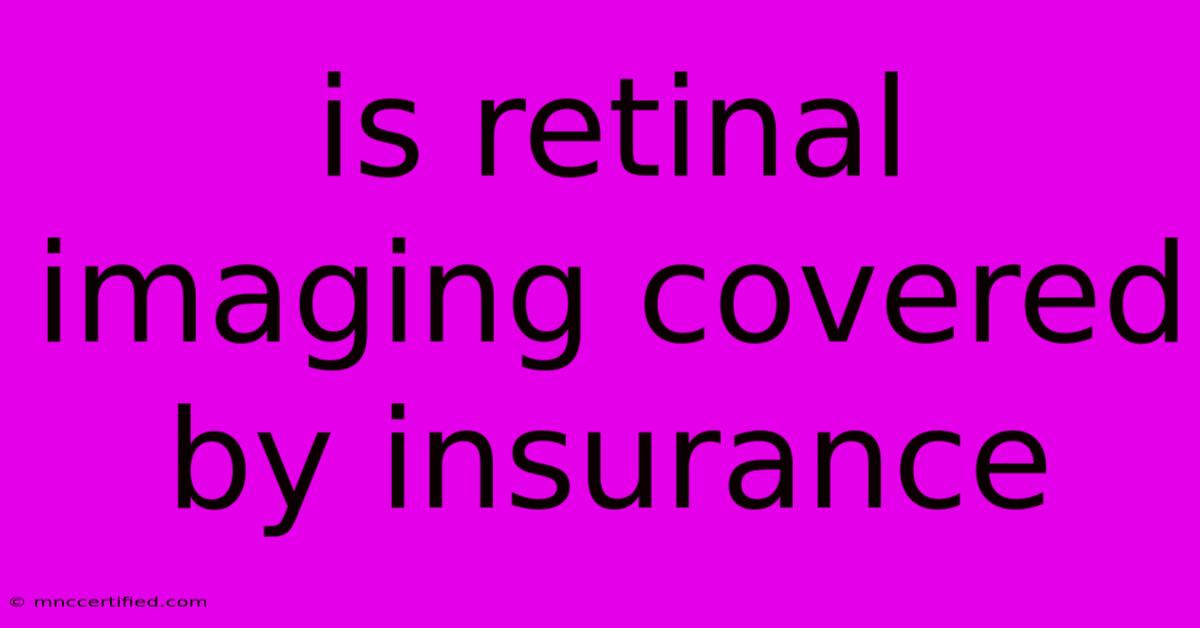Is Retinal Imaging Covered By Insurance

Table of Contents
Is Retinal Imaging Covered by Insurance? A Comprehensive Guide
Retinal imaging, also known as retinal photography, is a non-invasive diagnostic tool used by ophthalmologists to capture images of the back of the eye, known as the retina. This valuable technology can detect early signs of eye diseases like diabetic retinopathy, macular degeneration, glaucoma, and more.
But a common question arises: is retinal imaging covered by insurance? The short answer is, it depends.
Factors Affecting Coverage
Several factors determine whether your insurance plan will cover retinal imaging:
- Your Specific Plan: Coverage varies greatly between insurance providers and individual plans.
- Medical Necessity: Your insurance company will generally cover retinal imaging if your doctor deems it medically necessary for diagnosis, treatment, or monitoring of an existing eye condition.
- Pre-Existing Conditions: If you have a diagnosed eye condition, such as diabetes or glaucoma, your insurance is more likely to cover regular retinal imaging.
- Preventive Care: Some insurance plans offer coverage for preventive eye exams, which might include retinal imaging if it's deemed a standard part of the exam.
- Age: Certain age groups may have increased risk for eye diseases, leading to broader coverage for retinal imaging.
How to Determine Coverage
- Contact Your Insurance Provider: The most accurate way to determine your coverage is to call your insurance company directly. Ask about their coverage for retinal imaging and what specific conditions they cover.
- Review Your Plan Documents: Carefully examine your insurance policy documents for details about covered services.
- Talk to Your Ophthalmologist: Your doctor can help clarify coverage details and can often pre-authorize the procedure for you.
What Happens if It's Not Covered?
If your insurance doesn't cover retinal imaging, don't despair! You can still get the procedure done, but you'll be responsible for paying the costs out of pocket. You can discuss payment plans or financing options with your ophthalmologist's office.
The Importance of Retinal Imaging
Regardless of coverage, retinal imaging is an essential tool for maintaining healthy vision. Early detection of eye diseases allows for timely treatment and helps prevent vision loss. Don't hesitate to schedule an appointment with your ophthalmologist if you have any concerns about your eye health.
Conclusion
Understanding your insurance coverage for retinal imaging is crucial for managing your eye health. By contacting your insurance provider and talking to your doctor, you can ensure that you receive the necessary diagnostic services for maintaining healthy vision. Remember, early detection is key to protecting your eyesight.

Thank you for visiting our website wich cover about Is Retinal Imaging Covered By Insurance. We hope the information provided has been useful to you. Feel free to contact us if you have any questions or need further assistance. See you next time and dont miss to bookmark.
Featured Posts
-
Trump Taps Susie Wiles As Chief Of Staff
Nov 08, 2024
-
Paul Mc Cartney To Perform At Bst Hyde Park
Nov 08, 2024
-
Bengals Vs Ravens Score And Live Updates
Nov 08, 2024
-
Manchester United Vs Paok Live Europa League
Nov 08, 2024
-
Event Cancellation Insurance Limitations
Nov 08, 2024